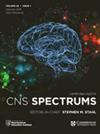Analysis of character shaping and mood intervention under higher education
IF 4.1
3区 医学
Q2 CLINICAL NEUROLOGY
引用次数: 0
Abstract
Background College education plays an important role in moral development and values, but some students may face mood disorders. Interventions in educational psychology can help students overcome obstacles and achieve well-rounded development. Subjects and Methods Students at one university were selected for the study, and data were collected using questionnaires and tools such as the Stanford Acute Stress Response Questionnaire (SASRQ) and 3-Minute Disorder Assessment Scale (3D-CAM). The experiment focused on students’ moral judgment, behavior, sense of burnout, sense of self-responsibility and emotional state. The data were processed by State statistical software. Results The results show that there are some differences in moral judgment and behavior of the students. Some students show burnout, lack of self-responsibility and emotional instability. Specific data are as follows: The mean score of moral judgment was 3.82 (SD =0.56), the mean score of behavioral performance was 4.05 (SD =0.61), the mean score of burnout was 2.94 (SD =0.72), the mean score of self-responsibility was 3.17 (SD =0.68), and the mean score of emotional state was 2.75 (SD =0.59). Conclusions The application of educational psychology in college education can take intervention measures. Developing educational programs and activities aims at character development to enhance moral judgment and behavior. For students with mood disorders, psychological counseling and support are provided to help overcome burnout, enhance the sense of self-responsibility, and adjust emotions. The Stanford Acute Stress Response Questionnaire (SASRQ) and 3-Minute Disorder Assessment Scale (3D-CAM) can assess mood disorders and psychological states and provide a basis for intervention.高等教育下的性格塑造与情绪干预分析
大学教育在道德发展和价值观方面发挥着重要作用,但一些学生可能面临情绪障碍。教育心理学的干预可以帮助学生克服障碍,实现全面发展。研究对象和方法选择一所大学的学生进行研究,使用问卷和工具(如斯坦福急性应激反应问卷(SASRQ)和3分钟障碍评估量表(3D-CAM))收集数据。实验重点关注学生的道德判断、行为、倦怠感、自我责任感和情绪状态。数据经国家统计软件处理。结果结果显示,学生的道德判断和行为存在一定差异。一些学生表现出倦怠、缺乏自我责任感和情绪不稳定。具体数据如下:道德判断平均得分3.82分(SD =0.56),行为表现平均得分4.05分(SD =0.61),倦怠平均得分2.94分(SD =0.72),自我责任平均得分3.17分(SD =0.68),情绪状态平均得分2.75分(SD =0.59)。结论教育心理学在高校教育中的应用可采取干预措施。发展教育计划和活动的目的是发展品格,提高道德判断和行为。对有情绪障碍的学生进行心理疏导和支持,帮助他们克服倦怠,增强自我责任感,调节情绪。斯坦福急性应激反应问卷(SASRQ)和3分钟障碍评估量表(3D-CAM)可以评估情绪障碍和心理状态,为干预提供依据。
本文章由计算机程序翻译,如有差异,请以英文原文为准。
求助全文
约1分钟内获得全文
求助全文
来源期刊

CNS Spectrums
医学-精神病学
CiteScore
6.20
自引率
6.10%
发文量
239
审稿时长
>12 weeks
期刊介绍:
CNS Spectrums covers all aspects of the clinical neurosciences, neurotherapeutics, and neuropsychopharmacology, particularly those pertinent to the clinician and clinical investigator. The journal features focused, in-depth reviews, perspectives, and original research articles. New therapeutics of all types in psychiatry, mental health, and neurology are emphasized, especially first in man studies, proof of concept studies, and translational basic neuroscience studies. Subject coverage spans the full spectrum of neuropsychiatry, focusing on those crossing traditional boundaries between neurology and psychiatry.
 求助内容:
求助内容: 应助结果提醒方式:
应助结果提醒方式:


